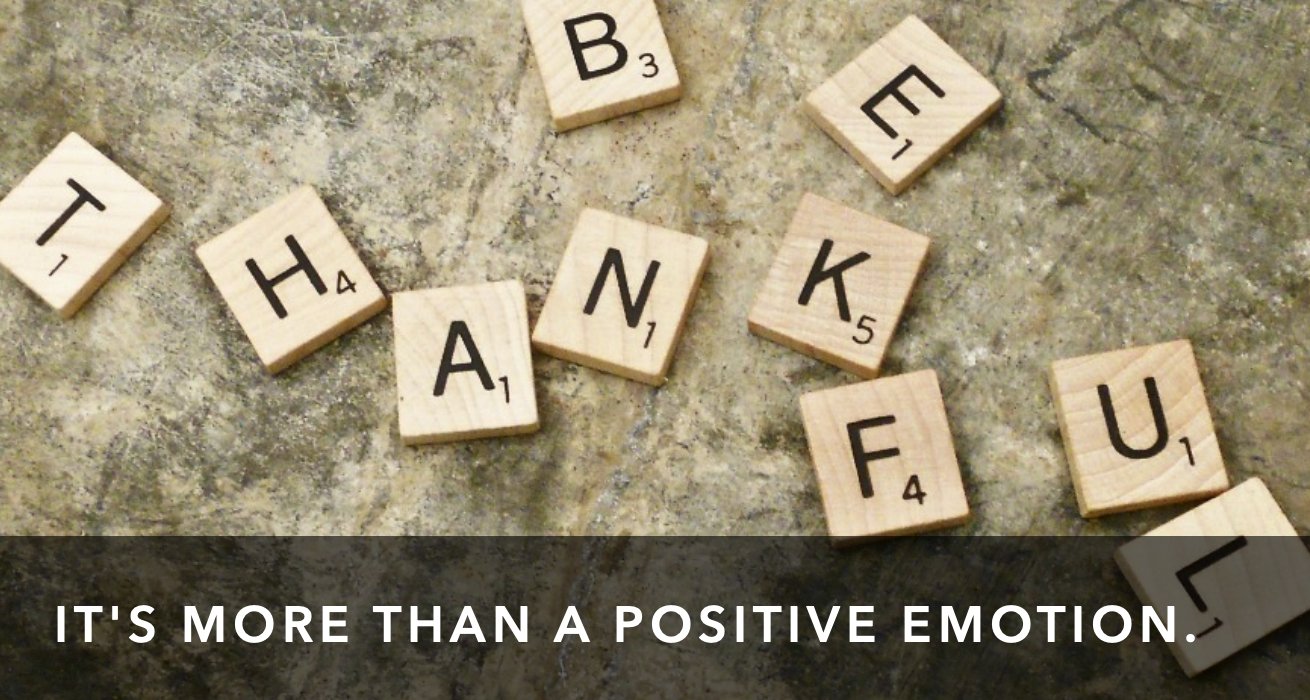9 min. to read.
Thanksgiving happened not too long ago. We only just finished all the leftovers in the ‘fridge. Maybe, at your house, too. Perhaps at your gathering, people went around the table sharing something they were thankful for. If you went to church that week, undoubtedly the sermon was about gratitude.
But then Black Friday came and all of a sudden, we’re all tumbling down the slope into the Christmas season. Thanksgiving was left behind in the rushing blur of life.
Most of us don’t think much more deeply about gratitude. As children, we were taught to say “thank you” when someone helped us, or served us, or gave us something. A word of thanks just seems to be part and parcel of polite relationship. Something so basic doesn’t seem to warrant further thought.
That’s too bad, because not only is gratitude the cornerstone for healthy spirituality. It’s also incredibly good for us. I mean that in literal, tangible, measurable ways!
Gratitude Can Lower Your Blood Pressure!
Maybe it comes as a surprise, but clinical studies are documenting the positive impact gratitude has on our lives. These studies have shown that people who experience and express gratitude are higher in positive emotions, life satisfaction, more socially oriented, more empathetic, more forgiving, and more supportive of others in their lives. These folks are less focused on material things and show a higher frequency of experiences of divine presence. (Want sources? I’ll share several below.)
That’s all impressive, but might it only mean that gratitude is just a result of having a good life? Well, more and more studies are asking that question. Is gratitude just the result of good experiences, or can it in some way bring about good experiences?
For example, a 2015 study examined people diagnosed with heart disease who were in the early stages of medical intervention. Their active participation in treatment could improve their condition, and maybe even save their lives. This population was evaluated for gratitude, as well as given gratefulness exercises. What did these researchers find? “We documented that an attitude of gratitude is related to better mood and sleep, less fatigue, more self-efficacy, and a lower cellular inflammatory index.”
Did you catch that last part? Lower cellular inflammation! You could write off mood and self-efficacy as subjective or temperamental, but lower cellular inflammation? That’s a concrete, measurable change.
Robert Emmons, a researcher who has been studying gratitude for more than a decade, says that’s precisely the case. His research suggests that a regular practice of gratitude results in stronger immune systems, less reported aches and pains, lower blood pressure, higher motivation to exercise and take care of one’s body, deeper, longer and more effective sleep, higher levels of positive emotions, more mental alertness, more reported joy, pleasure, optimism, and happiness. Not to mention dramatic improvements in our relationships, as well as less reported feelings of loneliness and isolation.
So is gratitude the miracle cure for what ails us? Is it something we should be practicing more than once a year? And how on earth is this connected to spiritual growth and following Jesus?

So why aren’t we more grateful?
Being grateful and practicing thankfulness are recurring subjects in scripture, occurring in hundreds of verses in both the Old and New Testament.
Being thankful to God is one of the most frequent themes of the Psalms. Instruction to give thanks shows up in nearly every one of Paul’s letters. In fact, the instruction to “be thankful” or “give thanks” shows up in scripture 37 times total.
That’s (maybe surprisingly) one more than the number of times scripture tells us to “be holy.” Why does it come up so often? Probably because we need it!
The world we live in, the culture that has formed us, is at its core, ungrateful.
We continually measure others by some standard of merit. Who deserves what, we ask? Who deserves God’s grace? Who deserves forgiveness? Who deserves that promotion at work? Who deserves a million views on Youtube? Who deserves healthcare and citizenship?
We want the world to be a meritocracy. (Well, that’s not entirely true. We want the world to function as a meritocracy where WE get to help define the standard of merit). Merit is so compelling because it’s a way to document and validate worth.
We’re all desperate to establish our own worth, so we turn all manner of measurable things into standards of merit. If you have a certain number of dollars, or followers, or books to your credit, you pass the standard. If you perform according to the purity rules of your religious group, your political tribe, or family culture, then you meet the standard. Do the right thing, look the right way, have the right stuff, and you deserve good things to come your way.
But here’s the insidious consequence: if we can prove that we deserve the good that comes to us, then we have no reason at all to be grateful. I suspect that’s one of the reasons gratitude is often a touchy thing for us or something we conveniently overlook.
We don’t like to be in debt to other people. We don’t want to acknowledge that whatever we’ve built—whether it’s a business, or a reputation, or a retirement account, or even a perspective we’ve come to through hard mental work—is contingent. We are dependant on other people.
Sometimes what we built is dependent on the generosity of others. Sometimes what we built is dependant on the exploitation of others. Sometimes we actively exploit by taking advantage of others. Sometimes we passively exploit by participating in systems where we benefit at others expense. Sometimes what we’ve built is dependant on collaboration or access given by someone, or learning from someone else who did the hard work or hard thinking before we came along.
Many of us seem a bit uncomfortable acknowledging that our entire lives come to us as a gift. Our deep need to feel worthy drives us to believe that we built all of that ourselves, through our hard work and ingenuity. We put in the hours, or the pain, or the effort. Don’t we deserve the good we have?
And so, expressing gratitude is not always easy. Real gratitude requires acknowledging that the good we have came to us from outside ourselves. Real gratitude is an acknowledgment of grace.
Gratitude is how we live in Grace
That brings us back to the Jesus way. See, the story about God and humanity we find in the teachings of Jesus is a story of grace.
Grace is God’s posture toward humanity. Grace originated in the Trinity. It exploded into creation. It defines God’s long-suffering patience. It motivated the incarnation and was embodied in the life, teaching, death, and resurrection of Jesus. Grace is what rescues us from one kingdom (a way of living) defined by self-centered, self-justifying selfishness and sin, and plants us in a new kingdom defined by other-centered co-suffering love.
Grace is everything. It is the nature of reality. When we encounter grace—unmerited favor—and let it seep into our minds and hearts—what is the natural response? Gratitude. Of course! Grace flows to us, and we respond with gratitude.
Gratefulness is simply seeing what’s true.
Gratitude is the essential marker of Spiritual Growth
That’s why gratitude is the best marker of spiritual growth. Spiritual maturity is about coming to live more and more in alignment with what is ultimately true.
When we begin to see that reality is fundamentally grace, it re-writes the stories that shape us. Instead of finding ourselves defined by the stories of lack, and alienation, and fear, and insufficiency that our merit-panicked world inculcates us with, something unexpected happens. Grace bursts in from the outside of that system and upends it. Grace undermines and contradicts our meritocracies.
Consider the role of grace in our lives.
We live because our parents sacrificed their lives, their time and money, sometimes even their dreams, to protect and provide for us — unmerited favor. That’s grace.
We get to do good work in the world because other people trained us, mentored us, and shared their experiences with us when they didn’t have to. Someone wrote the procedure manual you live by. Someone created the apps you use to do your work. Someone created the company you work for. None of that had to happen. We benefit from it. That’s grace.
We know the things we know because others before us have explored and wondered, experimented and written. None of us had to invent fire, or the wheel, or (thank God) how to remove a burst appendix. That’s grace.
We wake up every morning because a new day dawns, completely outside of our control. Our lungs breathe in the air, our brains process chemicals and electricity, our hearts pump blood, largely outside of our control—and with no regard for what we deserve. That new day is entirely grace.
And now, in Christ, we have learned that God sees us as beloved, included, and invites us to become a part of the Trinity’s never-ending, never-failing eternal dance of love. That’s grace. Amazing grace.
Gratitude is our response! Gratitude is how we align with reality.
Then it turns out, living in alignment with reality has the power to make your life better, even when it comes to things like blood pressure, and sleep, and cellular inflammation.
Want to look at the research yourself? Here are some sources for what I shared above as well as some other great gratitude resources:
- An excellent article that summarizes the current clinical thinking about gratitude in a very easy to grasp way.
- Get started with Robert Emmon here in this article. You can also find links to his original research here.
- Some great ideas on incorporating more gratitude in your life.
Some academic studies you can review:
- “Do Gratitude and Spirituality Predict Psychological Distress” by Rosmarin, Krumrei and Pargament.
- “The Role of Gratitude in Spiritual Well-Being in Asymptomatic Heart Failure Patients” by Wood and Chopra
- “The Grateful Disposition: A Conceptual and Empirical Topography” by McCullough, Emmons, and Tsang.

What a timely article at this time of the year – Christmas – and the grace of God – for which I will be forever grateful!
Thanks for the comment! I’m thankful you are reading and finding it helpful.
Excellent writeup!
Thanks, Cindy. Glad to have you stop by and read.
Gratitude is my word for the year, along with Providence. The last two years’ words were perseverance and abide, so it only seems natural that being thankful for God’s providence would follow. I am thankful for your words of wisdom and encouragement .
Good word! Even better practice. Thanks for sharing your encouragement with me!